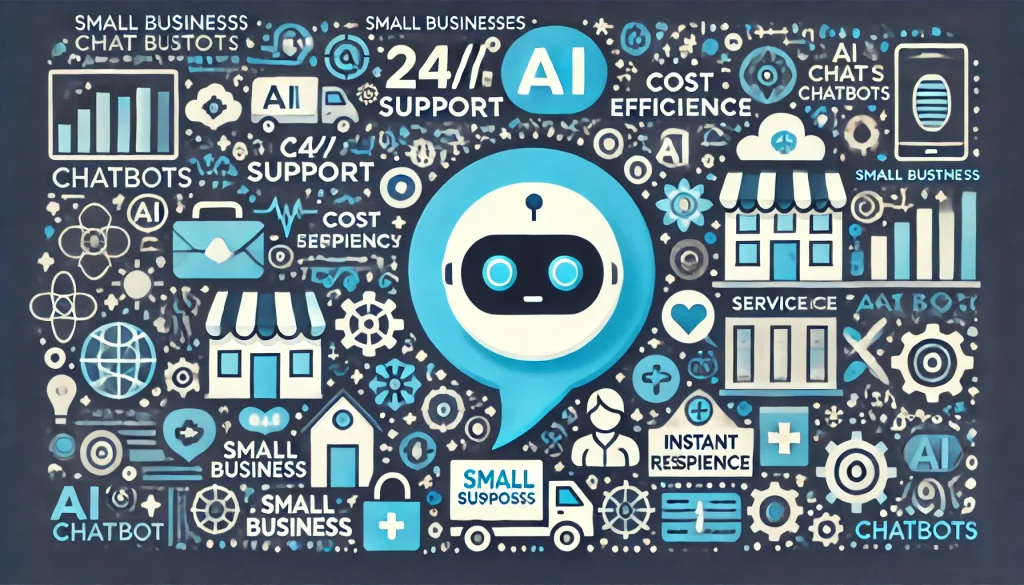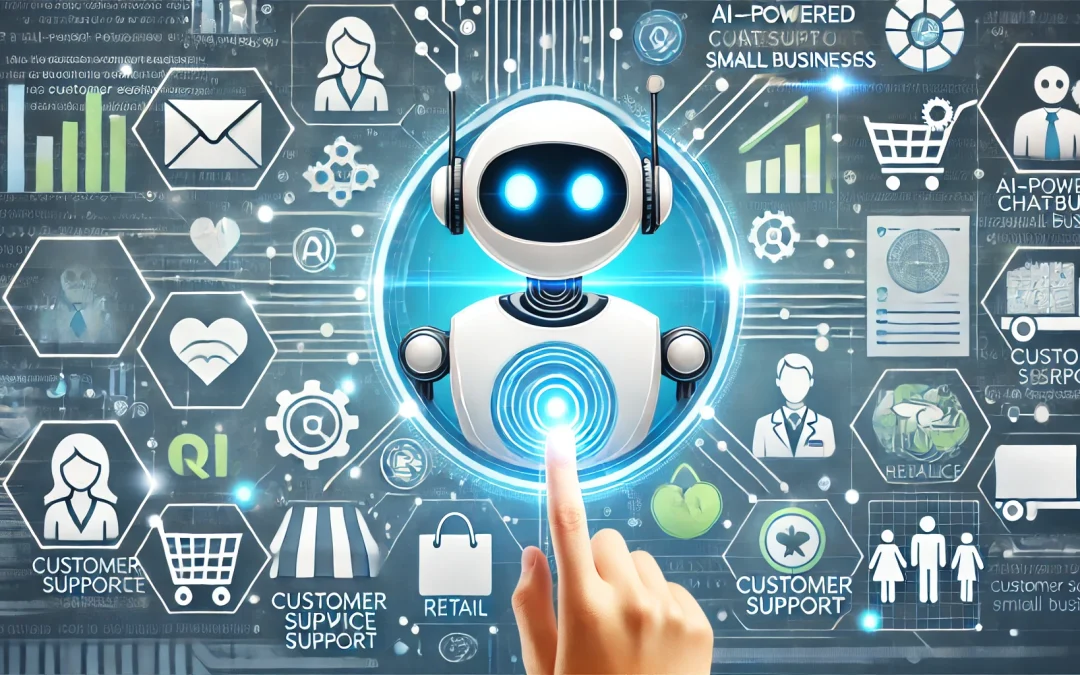In today’s fast-paced world, customers expect quick and efficient support. AI-powered chatbots have revolutionized the way businesses interact with their customers, offering 24/7 support, instant responses, and personalized service. For small businesses, leveraging chatbots can lead to better customer satisfaction, increased efficiency, and cost savings.
In this blog, we’ll explore how AI-powered chatbots for customer support are transforming small businesses, with examples of how different industries can benefit.
What Are AI-Powered Chatbots?
AI-powered chatbots are automated programs that use artificial intelligence (AI) and natural language processing (NLP) to understand and respond to customer queries. Unlike traditional chatbots that follow a set of pre-programmed rules, AI chatbots learn from each interaction, becoming more accurate and effective over time.
These chatbots can handle various customer service tasks, including answering FAQs, processing orders, scheduling appointments, and providing product recommendations, making them a valuable tool for businesses of all sizes.
Why Small Businesses Should Use AI-Powered Chatbots

- 24/7 Customer Support One of the most significant benefits of AI-powered chatbots for customer support is their ability to provide round-the-clock assistance. Small businesses may not have the resources to hire a full customer support team, especially during off-hours. Chatbots fill this gap by answering customer queries any time of the day, ensuring that no question goes unanswered.
For example, an e-commerce store can use a chatbot to handle order inquiries, shipping status, and return requests, even when the support team is not available. This improves customer satisfaction and builds trust.
- Instant Responses Customers want quick answers to their questions, and delays can lead to frustration. AI chatbots can respond instantly, reducing wait times and improving the overall customer experience. For businesses that receive a high volume of inquiries, chatbots help manage customer interactions efficiently, allowing human agents to focus on more complex issues.
For example, a healthcare clinic can use a chatbot to schedule appointments, answer common health questions, and provide information about services, all within seconds.
- Cost-Effective Solution Hiring and training a customer support team can be expensive, particularly for small businesses. AI chatbots offer a cost-effective alternative by automating routine tasks, reducing the need for additional staff. This allows businesses to allocate their budget to other critical areas, such as marketing and product development.
For instance, a startup company can use a chatbot to handle inquiries about its products, saving on customer support costs while maintaining a high level of service.
- Personalized Customer Experience AI-powered chatbots can analyze customer data and provide personalized recommendations based on previous interactions, purchase history, and preferences. This level of personalization enhances the customer experience by making it feel more tailored to individual needs.
For example, a retail store can use a chatbot to suggest products based on a customer’s past purchases, helping to increase sales and improve customer loyalty.
How Different Sectors Can Benefit from AI Chatbots
- Retail & E-commerce In the retail sector, AI chatbots can handle various tasks, from answering product inquiries to guiding customers through the checkout process. They can also provide product recommendations based on customer preferences, leading to increased sales and improved customer engagement.
For example, a fashion e-commerce store can use a chatbot to suggest outfits based on current trends, style preferences, and past purchases. This not only makes shopping easier for customers but also encourages them to make additional purchases.
- Healthcare AI chatbots in the healthcare industry can assist with scheduling appointments, providing basic health information, and answering common patient questions. This is particularly useful for clinics and hospitals that handle a large volume of inquiries daily.
For instance, a dental clinic can use a chatbot to answer questions about treatment options, provide information about appointment availability, and send reminders to patients, reducing the workload for administrative staff.
- Finance & Banking The finance and banking sectors can benefit from AI chatbots by offering services such as account inquiries, fraud alerts, and assistance with online banking. Chatbots can also provide personalized financial advice based on a customer’s spending habits, helping them manage their finances more effectively.
For example, a bank can use a chatbot to help customers check their account balance, transfer funds, or inquire about loan options, all without needing to speak to a live agent. This improves customer satisfaction while reducing call center volume.
- Hospitality & Travel In the hospitality and travel industry, AI chatbots can streamline the booking process, provide information about services, and handle customer inquiries about reservations. Chatbots can also offer personalized recommendations for hotels, activities, and travel packages based on customer preferences.
For example, a hotel chain can use a chatbot to manage booking requests, answer questions about room availability, and provide information about local attractions, enhancing the guest experience from the start.
Key Features to Look for in an AI-Powered Chatbot
- Natural Language Processing (NLP) NLP allows chatbots to understand and interpret human language, making conversations feel more natural and engaging. This feature is essential for providing accurate and relevant responses to customer queries.
- Machine Learning Capabilities Machine learning enables chatbots to learn from each interaction and improve over time. This ensures that the chatbot becomes more efficient and accurate as it gains experience, leading to better customer interactions.
- Seamless Integration Your AI-powered chatbot should integrate seamlessly with your existing systems, including CRM, e-commerce platforms, and communication channels. This allows the chatbot to access relevant customer information and provide personalized support.
- Multi-Channel Support Look for chatbots that can operate across multiple channels, including websites, social media platforms, and messaging apps like WhatsApp or Facebook Messenger. This ensures that your customers can reach you on their preferred platform, leading to a more consistent experience.
Common Mistakes to Avoid When Implementing AI Chatbots
- Not Providing Clear Objectives Before implementing a chatbot, it’s essential to define clear objectives. Determine what tasks you want the chatbot to handle, such as answering FAQs, booking appointments, or processing orders. Without clear goals, the chatbot may not deliver the desired results.
- Overloading the Chatbot While AI chatbots are capable of handling multiple tasks, overloading them with too many responsibilities can lead to confusion and errors. Focus on automating simple, repetitive tasks, and let human agents handle more complex issues.
- Ignoring Customer Feedback Customer feedback is essential for improving the performance of AI chatbots. Regularly review customer interactions and gather feedback to identify areas where the chatbot can be enhanced. This ensures that your chatbot remains efficient and user-friendly.
Conclusion
AI-powered chatbots are transforming the way small businesses handle customer support, offering a cost-effective, efficient, and personalized solution to meet customer needs. Whether you’re in retail, healthcare, finance, or hospitality, AI-powered chatbots for customer support can streamline processes, improve customer satisfaction, and drive business growth.
At Intelemax, we specialize in implementing AI chatbot solutions that enhance customer experience and operational efficiency. Ready to take your customer support to the next level? Contact us today to learn more.

